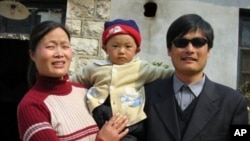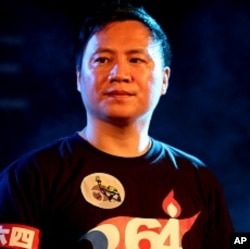After leaving the U.S. embassy and checking into a Chinese hospital, blind Chinese activist, Chen Guangcheng, may have lost his best chance to leave the country. Other Chinese dissidents have chosen exile to ensure their family's safety, but the choice carries drawbacks for their advocacy work.
Exiled activist
Wang says after his first jail term in 1993, authorities offered him the chance to leave China but he decided against it.
“I thought I could still do something for China from within,” he said. “At the time most people had been arrested, or did not dare to talk. I thought it was best for me at least to keep talking.”
But in 1998, facing an 11-year jail sentence, Wang realized that his future in China would have meant only confinement.
“I could do nothing to promote democracy in China,” he explained, “I thought it best to go to the U.S. and improve myself."
Wang has since earned a doctoral degree in history at Harvard University. He is now an assistant professor at Tsinghua University in Taiwan and has been blacklisted from ever returning to the mainland.
Chen's story
A self-taught lawyer, Chen Guangcheng collected testimony of forced abortions and sterilizations in his own province, Shandong, where local family planning officials were using coercive measures to meet the requirements of China's one child policy.
Chen's attempts to bring a class action lawsuit on behalf of female victims angered authorities, who responded by giving him a four-year jail sentence on charges of damaging property and organizing a mob. Even after he was released from jail, local officials illegally kept him under tightly-guarded house arrest, until last week, when with the help of supporters he fled his village and went to Beijing.
U.S. officials say during the six days Chen Guangcheng took shelter inside the American embassy, he expressed no intention of leaving China.
Stay or leave?
Joshua Rosenzweig, an independent human rights researcher based in Hong Kong, recognizes that a decision either way carries downsides.
“Working within the Chinese context involves a great deal of risk,” he said, adding that activists need to be careful in their efforts and accept only very gradual change.
For those dissidents who choose safety and flee the country, there is the new problem of remaining engaged with people inside China.
“There is a conventional view among many that once an activist, or a dissident leaves the borders of China they simply, become irrelevant,” Rosenzweig said.
In recent years the Internet has helped narrow this gap and connect activists to their peers inside China, despite authorities’ ability to cut off and monitor electronic communications.
Unusual offer
Before leaving the U.S. embassy, Chen was reportedly offered what activists have said would be a highly unusual deal in which he could live freely in China, and enroll into a university without government harassment. American officials said they would monitor the situation and make sure the Chinese did not backtrack from its commitment to keep Chen and his family out of harm's way.
Human Rights Watch's Sophie Richardson points out that Beijing is trying to guarantee rights that Chen, as a Chinese citizen, should already have.
“The guarantees that have been offered up to him are ridiculous in the sense that these are rights and freedoms that already should be guaranteed to him under existing Chinese laws,” she said. "Let's point a finger where it belongs, which is back at the government, which continues in one way or another, which it does with all activists, to threaten them over their work.”
Wang Dan, who recently co-signed a letter asking the Chinese government to give exiled dissidents permission to visit China, agrees that Beijing's reassurances might be short-lived.
“The authorities might say that they won’t harass him, but I think nonetheless that there would be covert spying and interference in his life. He will not have the opportunity to do what he really wants to,” Wang said.
Other Chinese Dissidents Who Have Left Their Homeland
| Fang Lizhi: The leading astrophysicist stayed at U.S. Embassy for 13 months after China's 1989 crackdown at Tiananmen Square. He left China in 1990 and died this year in the U.S. | |
| Wei Jingsheng: The democracy activist flew to the U.S. in 1997 after more than 14 years in prison. | |
| Rebiya Kadeer: Convicted of endangering state security, the Uighur rights activist now lives in the U.S. | |
| Wu'er Kaixi: The student leader fled China with the help of a secret network after the Tiananmen Square demonstrations. | |
| Liao Yiwu: Known for "The Corpse Walker" interviews with people on the margin of Chinese society, he fled to Germany in 2011 | |
| Yu Jie: Authored a book critical of Premier Wen Jiabao and left for the U.S. in 2012 after being detained repeatedly and beaten. | |










